 com.imsl.math.Sfun
com.imsl.math.Sfun
|
JMSLTM Numerical Library 4.0 | ||||||||
| PREV CLASS NEXT CLASS | FRAMES NO FRAMES | ||||||||
| SUMMARY: NESTED | FIELD | CONSTR | METHOD | DETAIL: FIELD | CONSTR | METHOD | ||||||||
java.lang.Objectcom.imsl.math.Sfun
Collection of special functions.
| Field Summary | |
static double |
EPSILON_LARGE
The largest relative spacing for doubles. |
static double |
EPSILON_SMALL
The smallest relative spacing for doubles. |
| Method Summary | |
static double |
beta(double a,
double b)
Returns the value of the Beta function. |
static double |
betaIncomplete(double x,
double p,
double q)
Returns the incomplete Beta function ratio. |
static double |
cot(double x)
Returns the cotangent of a double. |
static double |
erf(double x)
Returns the error function of a double. |
static double |
erfc(double x)
Returns the complementary error function of a double. |
static double |
erfcInverse(double x)
Returns the inverse of the complementary error function. |
static double |
erfInverse(double x)
Returns the inverse of the error function. |
static double |
fact(int n)
Returns the factorial of an integer. |
static double |
gamma(double x)
Returns the Gamma function of a double. |
static double |
log10(double x)
Returns the common (base 10) logarithm of a double. |
static double |
logBeta(double a,
double b)
Returns the logarithm of the Beta function. |
static double |
logGamma(double x)
Returns the logarithm of the Gamma function of the absolute value of a double. |
static double |
poch(double a,
double x)
Returns a generalization of Pochhammer's symbol. |
static double |
r9lgmc(double x)
Returns the log gamma correction term for argument values greater than or equal to 10.0. |
static double |
sign(double x,
double y)
Returns the value of x with the sign of y. |
| Methods inherited from class java.lang.Object |
clone, equals, finalize, getClass, hashCode, notify, notifyAll, toString, wait, wait, wait |
| Field Detail |
public static final double EPSILON_LARGE
public static final double EPSILON_SMALL
| Method Detail |
public static double beta(double a,
double b)
![]()
gamma for the definition of The method beta requires that both arguments be positive.
a - a double valueb - a double value
double value specifying the Beta function
public static double betaIncomplete(double x,
double p,
double q)
![]()
beta for the definition of
The parameters p and q must both be greater than zero. The argument x must lie in the range 0 to 1. The incomplete beta function can underflow for sufficiently small x and large p; however, this underflow is not reported as an error. Instead, the value zero is returned as the function value.
The method betaIncomplete is based on the work of Bosten
and Battiste (1974).
x - a double value specifying the upper limit of integration
It must be in the interval [0,1] inclusive.p - a double value specifying the first Beta parameter. It
must be positive.q - a double value specifying the second Beta parameter. It
must be positive.
double value specifying the incomplete Beta function ratiopublic static double cot(double x)
double.
x - a double value
double value specifying the cotangent of x.
If x is NaN, the result is NaN.public static double erf(double x)
double.
The error function method, erf(x),
is defined to be
![]()
All values of x are legal.
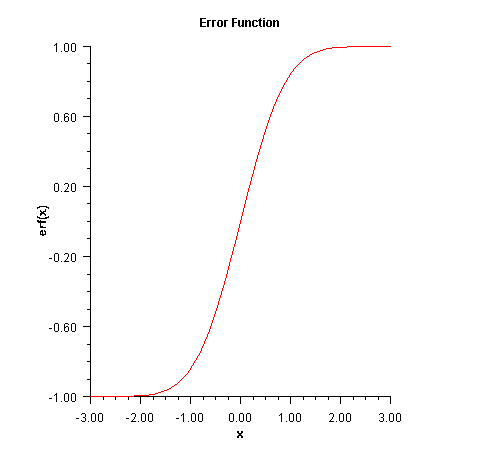
x - a double value
double value specifying the error function of xpublic static double erfc(double x)
double.
The complementary error function method, erfc
(x), is defined to be
![]()
The argument x must not be so large that the result underflows. Approximately, x should be less than
![]()
where s = Double.MIN_VALUE is the smallest representable positive floating-point number.
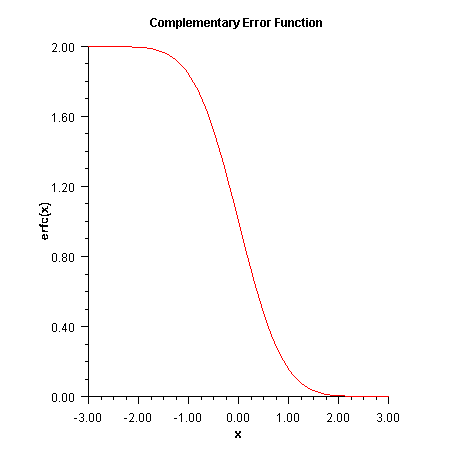
x - a double value
double value specifying the complementary error
function of xpublic static double erfcInverse(double x)
The erfcinverse(x) method computes the inverse of
the complementary error function erfc x, defined in erfc.
erfcinverse(x) is defined for ![]() . If
. If ![]() ,
then the answer will be less accurate than half precision. Very
approximately,
,
then the answer will be less accurate than half precision. Very
approximately,
![]()
where ![]() = machine precision
(approximately 1.11e-16).
= machine precision
(approximately 1.11e-16).
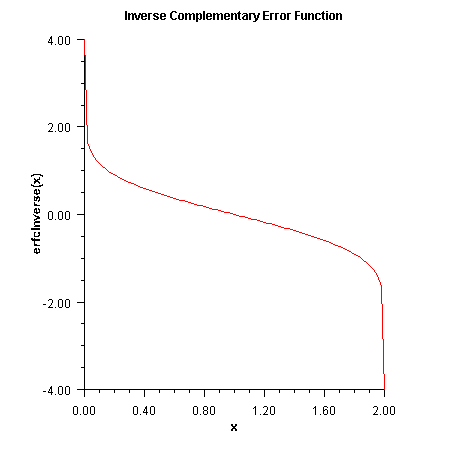
x - a double value, double value specifying the inverse of the
error function of x.public static double erfInverse(double x)
erfInverse(X) method computes the inverse of the
error function erf x, defined in
erf.
The method erfInverse(X) is defined for
![]() , then the
answer will be less accurate than half precision. Very approximately,
, then the
answer will be less accurate than half precision. Very approximately,
![]()
where ![]() is the machine precision
(approximately 1.11e-16).
is the machine precision
(approximately 1.11e-16).
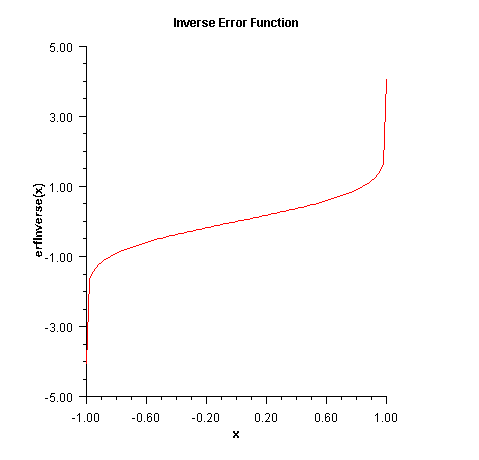
x - a double value
double value specifying the inverse
of the error function of xpublic static double fact(int n)
n - an int value
double value specifying the factorial of n, n!.
If x is negative, the result is NaN.public static double gamma(double x)
double.
The gamma function, ![]() , is defined to be
, is defined to be
![]()
For ![]() , the above definition is extended
by analytic continuation.
, the above definition is extended
by analytic continuation.
The gamma function is not defined for integers less than or equal to
zero. Also, the argument x must be greater than
![]() so that
so that ![]() does not underflow, and x must be less than
171.64 so that
does not underflow, and x must be less than
171.64 so that ![]() does not overflow. The underflow limit occurs first for arguments that
are close to large negative half integers. Even though other arguments
away from these half integers may yield machine-representable values of
does not overflow. The underflow limit occurs first for arguments that
are close to large negative half integers. Even though other arguments
away from these half integers may yield machine-representable values of
![]() , such arguments are considered illegal.
Users who need such values should use the log gamma. Finally, the
argument should not be so close to a negative integer that the result
is less accurate than half precision.
, such arguments are considered illegal.
Users who need such values should use the log gamma. Finally, the
argument should not be so close to a negative integer that the result
is less accurate than half precision.
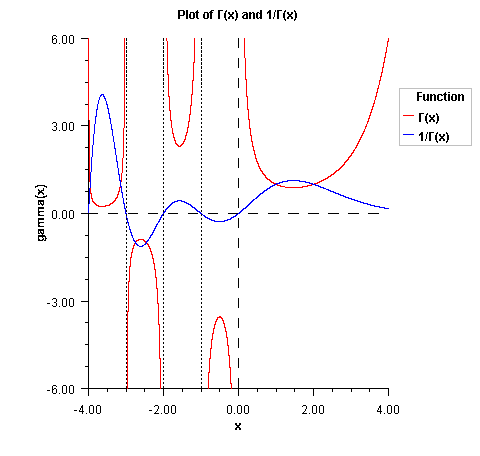
x - a double value
double value specifying the Gamma function of x.
If x is a negative integer, the result is NaN.public static double log10(double x)
double.
x - a double value
double value specifying the common logarithm of x
public static double logBeta(double a,
double b)
Method logBeta computes ![]() . See
. See
beta for the definition of ![]() .
.
logBeta is defined for a > 0 and
b > 0. It returns accurate results even when
a or b is very small. It can
overflow for very large arguments; this error condition is not detected
except by the computer hardware.
a - a double valueb - a double value
double value specifying the natural logarithm
of the Beta functionpublic static double logGamma(double x)
double.
Method logGamma computes ![]() . See
. See gamma for the
definition of ![]() .
.
The gamma function is not defined for integers less than or equal to
zero. Also, ![]() must not be so large
that the result overflows. Neither should x be so
close to a negative integer that the accuracy is worse than half precision.
must not be so large
that the result overflows. Neither should x be so
close to a negative integer that the accuracy is worse than half precision.
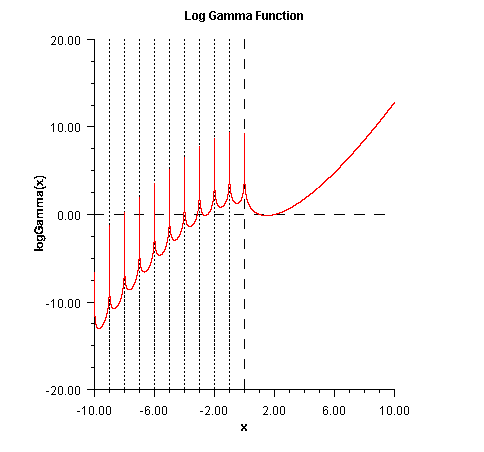
x - a double value
double value specifying the natural logarithm
of the Gamma function of
public static double poch(double a,
double x)
Method poch evaluates Pochhammer's symbol
![]() for n a
nonnegative integer. Pochhammer's generalized symbol is defined to be
for n a
nonnegative integer. Pochhammer's generalized symbol is defined to be
![]()
See gamma for the definition of
![]() .
.
Note that a straightforward evaluation of Pochhammer's generalized symbol with either gamma or log gamma functions can be especially unreliable when a is large or x is small.
Substantial loss can occur if a + x or
a are close to a negative integer unless
![]() is sufficiently small. To insure
that the result does not overflow or underflow, one can keep the arguments
a and a + x well within the
range dictated by the gamma function method gamma or one can keep
is sufficiently small. To insure
that the result does not overflow or underflow, one can keep the arguments
a and a + x well within the
range dictated by the gamma function method gamma or one can keep
![]() small whenever a
is large.
small whenever a
is large. poch also works for a variety of arguments outside
these rough limits, but any more general limits that are also useful are
difficult to specify.
a - a double value specifying the first argumentx - a double value specifying the second, differential argument
double value specifying the generalized Pochhammer symbol,
gamma(a+x)/gamma(a)public static double r9lgmc(double x)
x - a double value
double value specifying the log gamma correction term.
public static double sign(double x,
double y)
x - a double valuey - a double value
double value specifying the absolute value of x
and the sign of y
|
JMSLTM Numerical Library 4.0 | ||||||||
| PREV CLASS NEXT CLASS | FRAMES NO FRAMES | ||||||||
| SUMMARY: NESTED | FIELD | CONSTR | METHOD | DETAIL: FIELD | CONSTR | METHOD | ||||||||